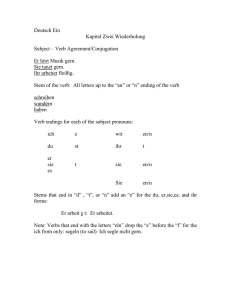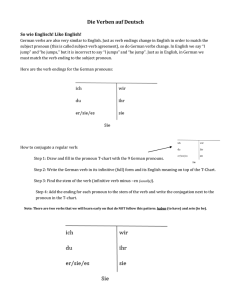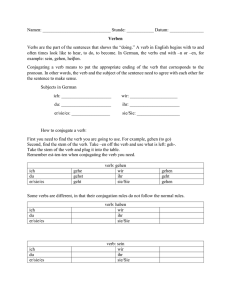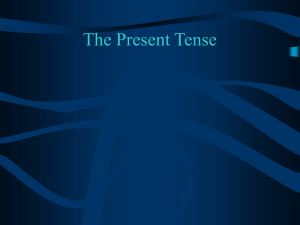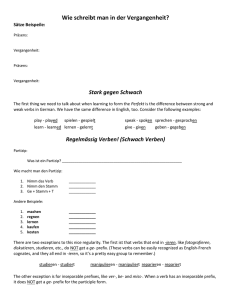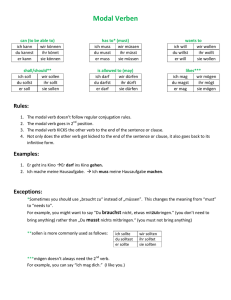German Defenite Articles
Werbung
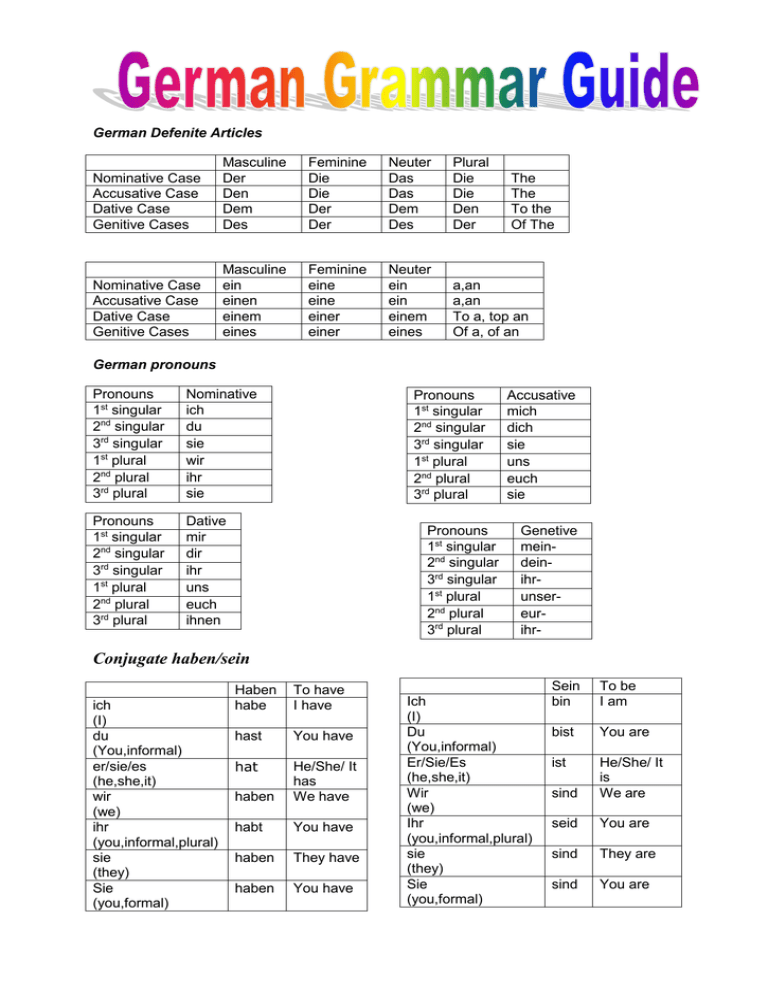
German Defenite Articles Nominative Case Accusative Case Dative Case Genitive Cases Masculine Der Den Dem Des Feminine Die Die Der Der Neuter Das Das Dem Des Plural Die Die Den Der Nominative Case Accusative Case Dative Case Genitive Cases Masculine ein einen einem eines Feminine eine eine einer einer Neuter ein ein einem eines a,an a,an To a, top an Of a, of an The The To the Of The German pronouns Pronouns 1st singular 2nd singular 3rd singular 1st plural 2nd plural 3rd plural Nominative ich du sie wir ihr sie Pronouns 1st singular 2nd singular 3rd singular 1st plural 2nd plural 3rd plural Dative mir dir ihr uns euch ihnen Pronouns 1st singular 2nd singular 3rd singular 1st plural 2nd plural 3rd plural Pronouns 1st singular 2nd singular 3rd singular 1st plural 2nd plural 3rd plural Accusative mich dich sie uns euch sie Genetive meindeinihrunsereurihr- Conjugate haben/sein ich (I) du (You,informal) er/sie/es (he,she,it) wir (we) ihr (you,informal,plural) sie (they) Sie (you,formal) Haben habe To have I have hast You have hat haben He/She/ It has We have habt You have haben They have haben You have Ich (I) Du (You,informal) Er/Sie/Es (he,she,it) Wir (we) Ihr (you,informal,plural) sie (they) Sie (you,formal) Sein bin To be I am bist You are ist sind He/She/ It is We are seid You are sind They are sind You are Perfect Tense of German Verbs As a general rule, in German the Perfect ense is used when Talking conversationally about events in the past, rather than when writing about them. As in English, the Perfect Tense in German needs two verb parts. They are: an auxiliary (helping) verb (it's a form of haben or sein), and the past participle of the verb. Ich habe Fußball gespielt. (I have played football) Past participle: Strong verbs usually have a past participle that ends in -en, but you have to learn the participle of each verb. e.g. fahren - gefahren, gehen - gegangen, schwimmen - geschwommen. The past participle of strong verbs is listed in the Table of Strong Verbs, which includes almost all strong verbs. Weak verbs form their past participle by putting ge- before the stem of the verb and -t on the end of the stem. If the stem ends in a -t or -d, you insert an -e- between the stem and that letter. e.g. machen - gemacht, sammeln - gesammelt, spielen - gespielt, arbeiten - gearbeitet infinitive = the non-conjugated form of a verb A noun = word used to name a person, animal, place, thing, and abstract idea. A verb= word used primarily to indicate a type of action, such as to fly or to wish, though it may also be used to indicate a general state of existence, such as to live. A pronoun =can replace a noun or another pronoun. An adjective =modifies a noun or a pronoun by describing, identifying, or quantifying words. In a sentence, every verb must have a subject. If the verb expresses action—like sneeze, jump, bark, or study—the subject is who or what does the verb. A direct object will follow a transitive verb [a type of action verb]. Direct objects can be nouns, pronouns, phrases, or clauses. If you can identify the subject and verb in a sentence, then finding the direct object—if one exists—is easy. Just remember this simple formula. An indirect object precedes the direct object and tells to whom or for whom the action of the verb is done and who is receiving the direct object. There must be a direct object to have an indirect object. Indirect objects are usually found with verbs of giving or communicating like give, bring, tell, show, take, or offer. An indirect object is always a noun or pronoun which is not part of a prepositional phrase. A preposition links nouns, pronouns and phrases to other words in a sentence. The word or phrase that the preposition introduces is called the object of the preposition. The Rule of all Rules German nouns ending in –o are usually neuter: das Auto, Büro, Kasino, Konto, Radio. Some of the exceptions are very common: die Avocado, der Euro, die Limo, der Zoo. German nouns ending in -ik are usually feminine: die Grammatik, Grafik, Klinik, Mathematik Another German feminine noun suffix is the -in ending. An -er ending usually indicates a masculine noun. However, some common nouns ending in -er are not masculine: das Fenster, die Mutter, die Schwester, die Tochter, das Wetter.
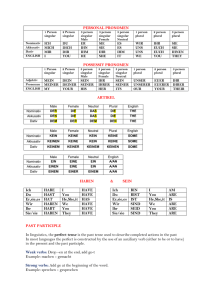
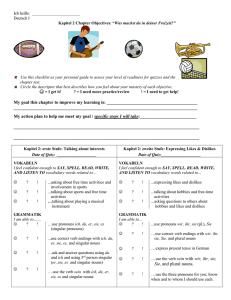
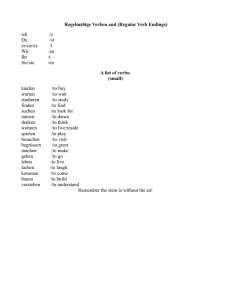
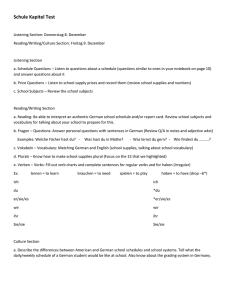
![D1A70204 Befehlformen [Command Forms] Commands (Befehle](http://s1.studylibde.com/store/data/006295093_1-ded304d13987e352eae01a2a5fa30f24-300x300.png)
![D1A5 Starke Verben [Strong Verbs]](http://s1.studylibde.com/store/data/005537802_1-7c1b99dd5766654382e175dbf31adcce-300x300.png)
